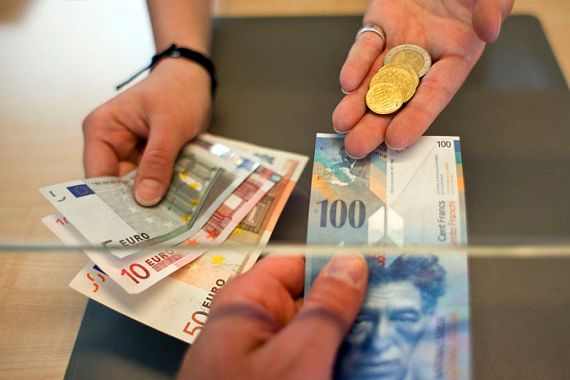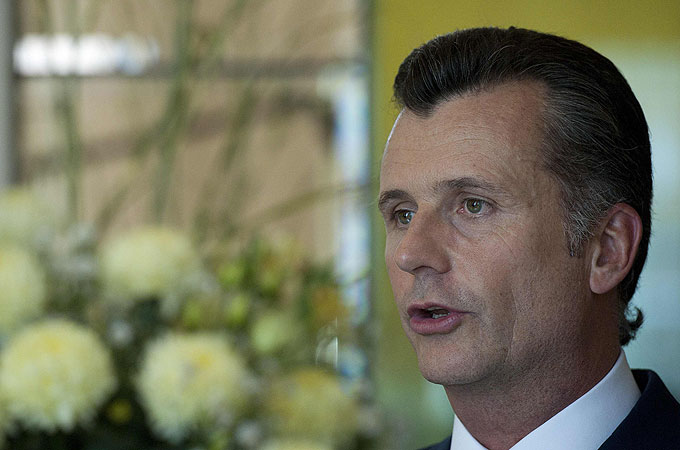Markets stunned as Swiss peg franc to euro
Central bank sets cap on exchange rate for soaring currency in bid to boost exports and discourage use as safe haven.

 |
| Hildebrand said the Swiss National Bank was ‘prepared to buy foreign currency in unlimited quantities’ [Reuters] |
The Swiss National Bank [SNB], the country’s central bank, has set an exchange rate cap on the soaring franc to stop the economy from sinking into recession in a move that stunned the market.
The SNB said on Tuesday that it would no longer tolerate an exchange rate below 1.20 francs to the euro and would defend the target by buying other currencies in unlimited quantities.
Keep reading
list of 4 itemsIndia-Iran port deal: A gateway to Central Asia or a geostrategic headache?
India’s income inequality widens, should wealth be redistributed?
Facebook, Instagram face EU scrutiny over addictive effects on children
The move immediately knocked about eight per cent off the value of the franc, which had soared by a third since the collapse of Lehman Brothers in 2008, as investors used it as a safe haven from the eurozone’s debt crisis and stock market turmoil.
“The current massive overvaluation of the Swiss franc poses an acute threat to the Swiss economy and carries the risk of a deflationary development,” the SNB said in a brief statement.
SNB Chairman Philipp Hildebrand said: “The SNB will enforce this minimum rate with the utmost determination and is prepared to buy foreign currency in unlimited quantities.”
Johann Schneider-Ammann, the Swiss economy minister who has proposed $1.1bn in government aid to counter the impact of the franc, welcomed the SNB action on Tuesday, saying: “It has a material impact and especially a psychological impact.”
Ulrike Rondorf, Commerzbank economist, said: “As the SNB’s pockets are very deep, it should succeed in stabilising the rate above 1.20.”
Expensive exports
The SNB, which holds its quarterly monetary policy review on September 15, said that even at a rate of 1.20 to the euro, the franc was still high and should continue to weaken over time.
“If the economic outlook and deflationary risks so require, the SNB will take further measures,” it said.
The SNB has warned that economic growth is set to slow sharply in the coming months as the strong franc makes Swiss exports, from luxury watches to drugs, prohibitively expensive.
The franc nearly touched parity with the common European currency on August 9.
It dived 8.5 per cent against the euro after Tuesday’s announcement to 1.203 francs at 1051 GMT and dropped almost eight per cent against the dollar to 0.848.
“That was the single largest foreign exchange move I have ever seen,” Jeremy Cook, World First chief economist, said.
The SNB temporarily managed to weaken the franc last month after it cut an already low interest rate target to zero on August 3 and boosted the amount of liquidity in the banking system.
But the currency jumped again last week as worries about the health of the global economy intensified.
Currency wars
Switzerland’s central bank is seen as being in a strong position to follow through on the new target after top Swiss politicians and business groups expressed support for the central bank as the economy flags.
“The strong national currency is presenting existential problems not only to the export sector and tourism but the whole Swiss economy,” Gerold Buehrer, president of business lobby group Economiesuisse, said in a statement.
Its foreign exchange holdings had already surged to $328m in August as a result of foreign exchange swaps the SNB launched to ease the franc.
The SNB step should also help economies in eastern Europe, with two-thirds of mortgages in Hungary and about half of Poland’s denominated in Swiss francs.
The action is being seen as a new shot in the currency wars, with Japan expected to try to weaken the yen if the Swiss action diverts more safe-haven inflows into the currency.
Fears that the world economy may tip back into recession have spurred investors to dump riskier assets such as shares and seek the relative safety of gold, the franc and yen.